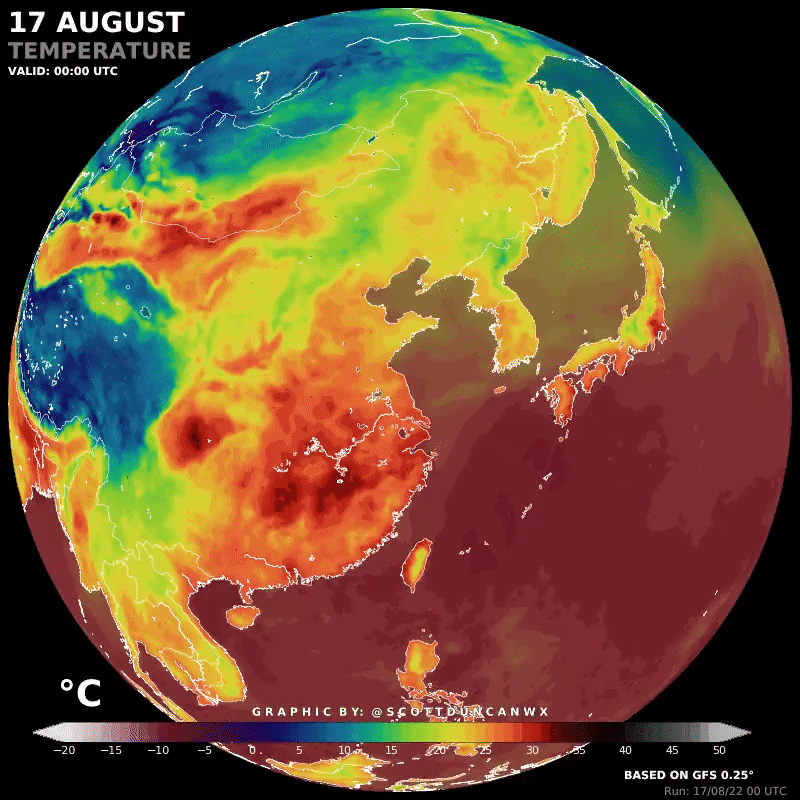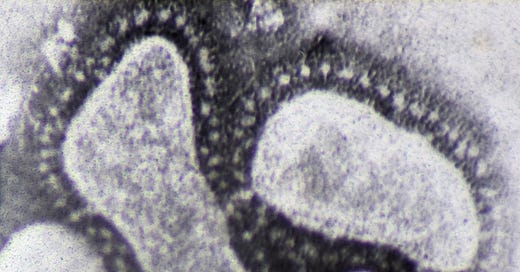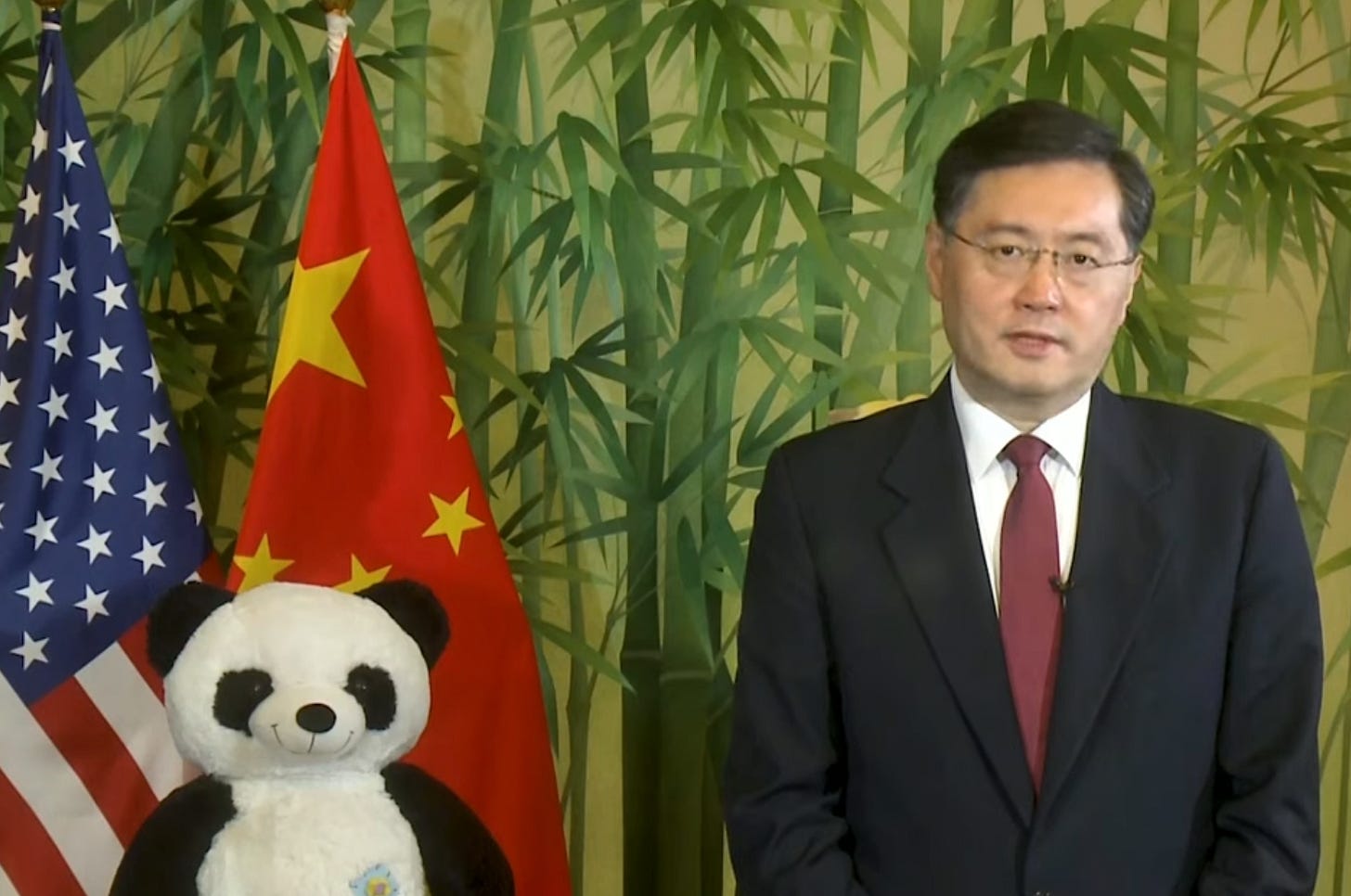An explanation, please?
More than 2-1/2 years since SARS-CoV-2 first broke out, we are still debating where the virus came from: China owes the world explanations, but so does the global scientific community.
Coronavirus in the wild. Photo: Dr Graham Beards; Creative Commons Attribution-Share Alike 4.0.
Science reports that China is no longer just denying the possibility of a lab leak; it’s increasingly stretching and limbering up to kick the SARS-CoV-2 origin narrative out and into someone else’s pitch.
From the start of the pandemic, the Chinese government—like many foreign researchers—has vigorously rejected the idea that SARS-CoV-2 somehow originated in the Wuhan Institute of Virology (WIV) and escaped. But over the past 2 years, it has also started to push back against what many regard as the only plausible alternative scenario: The pandemic started in China with a virus that naturally jumped from bats to an ‘intermediate’ species and then to humans—most likely at the Huanan Seafood Market in Wuhan.
‘Its goal is to avoid being blamed for the pandemic in any way, says Filippa Lentzos, a sociologist at King’s College London who studies biological threats and health security. ‘China just doesn’t want to look bad,’ she says. ‘They need to maintain an image of control and competence. And that is what goes through everything they do.’
China has long been a high achiever in the “repeat a lie often enough and it becomes truth” game. It also thrives on divisions, and the origin of SARS-CoV-2 is an extremely divisive issue in the scientific community.
‘The idea that the pandemic didn’t originate in China is inconsistent with so many other things,’ says Jesse Bloom, a virologist at the Fred Hutchinson Cancer Research Center who has argued for more intensive studies of the WIV lab accident scenario. ‘When you eliminate the absurd, it’s Wuhan,’ says virologist Gregory Towers of University College London, who leans toward a natural origin.
All the same, scientists may be at loggerheads over how the original viral spillover event happened and how it arrived so wonderfully adapted to human beings, but they’re not so divided over where the virus first made its move.
For the record, ChinaDiction is agnostic on the origins debate, leaning toward the lab leak as the most likely scenario but accepting that a wet market spillover is also plausible – if only we could find the virus in another species.
Too damn hot
Air-con units and laundry in a very hot Chinese summer – Shanghai, Pudong. Photo: WikiCommons.
The New York Times reminds us that China is burning – literally – with record temperatures causing blackouts and factory shutdowns, which …
… point to the ways that extreme weather is adding to China’s economic woes. The economy has been headed toward its slowest pace of growth in years, dragged down by the country’s stringent Covid policy of lockdowns, quarantines and travel restrictions, as consumers tightened spending and factories produced less. Youth unemployment has reached a record high, while trouble in the real estate sector has set off an unusual surge of public discontent.
Bloomberg reports that southwestern Sichuan Province, one of China’s most populous provinces and a key manufacturing hub, is under particular stress:
Current peak load of electricity demand in Sichuan jumped to 65 million kilowatts, an increase of 25% over the previous year, local authorities and power grid officials said at a press briefing on Saturday. At the same time, water inflows for hydro power generation more than halved, and the main reservoirs that secure power consumption of load centers such as the provincial capital of Chengdu has reached dead storage level.
Data from National Meteorological Centre showed Chengdu has had no rain for 15 days this month and the neighboring city of Chongqing has suffered the same for 18 days. The cities of Nanjing in Jiangsu province, and Nanchang in Jiangxi province had no rain at all this month.
The power shortage adds another challenge to companies already contending with the country’s adherence to Covid Zero, which includes sudden lockdowns, constant testing and movement curbs. That has weighed on consumer sentiment and wrought havoc on the manufacturing sector.
The Financial Times notes, phlegmatically, it’s not just China; it’s the entire world.
Factories grinding to a halt, crops devastated, cargo ships forced to carry smaller loads and millions facing a risk of blackouts — these are just some of the drastic consequences of record low river levels during droughts that are gripping the US, Europe and now [emphasis added] China.


We made our point
Says China.
But it’s pure domestic politics. The US and Japan, not to mention Taiwan, must have gained a plenitude of insights into China’s ability to project power.

US ambassador pressures China on the ‘status quo’
Deputy Secretary of State Wendy Sherman swears in Nicholas Burns as the US ambassador to the People’s Republic of China. Photo: Freddie Everett; U.S. Department of State.
CNN reports that, according to US Ambassador to China Nicholas Burns, China needs to do more to convince us all it’s not the troublemaker on the Taiwan issue.
China needs to convince the rest of the world it is not an ‘agent of instability’ and will act peacefully in the Taiwan Strait …. Burns said in his first TV interview since taking up his post in Beijing six months ago.
Burns spoke candidly about Beijing’s reaction to a visit by United States House Speaker Nancy Pelosi to Taiwan earlier this month, to which China responded by launching extensive military drills around the self-governing island and suspending key diplomatic communications with the US.
‘We do not believe there should be a crisis in US-China relations over the visit – the peaceful visit – of the Speaker of the House of Representatives to Taiwan … it was a manufactured crisis by the government in Beijing. It was an overreaction,’ Burns told CNN Friday from the US Embassy.
Chinese ambassador furious
China’s ambassador to the US, Qin Gang, pictured on International Panda Day. Photo: Smithsonian's National Zoo.
Politico, among other media outlets, reported last week on the fury of China’s US ambassador at Pelosi’s visit to Taiwan.
Qin Gang, came out swinging this morning in a near-90-minute press briefing in which he signaled that Beijing is nowhere near ready to tone down its public rancor at the Biden administration.
Qin slammed House Speaker Nancy Pelosi’s recent Taiwan visit as a “political provocation,” accused the U.S. of “changing the status quo” in the Taiwan Strait and called U.S. arms sales to Taipei a violation of the U.S.-China August 1982 Joint Communique.
Qin’s expression of personal resentment at the limits of his diplomatic influence reflects his dismay that his best efforts to derail the Pelosi trip — backed by a Chinese Foreign Ministry insistence that “the U.S. executive branch has the responsibility to stop such a visit” were unsuccessful. That suggests willful ignorance of the separation of powers between the U.S. executive and legislative branches that made such an intervention impossible.
“There’s a sense of frustration beyond words [in the Chinese embassy] that ‘How could [Pelosi] just not listen to any of the things that we said and how could the Biden administration not stop her?’” said Yun Sun, China program director at the Stimson Center.

Qin Gang taking to Twitter – banned in China – argues for defending the “national dignity of Chinese people,” which for odd reasons seems to involve invading Taiwan, probably bits of Japan and India and Tajikistan too.
Are Pakistan, Sri Lanka, Bhutan, Burma, Laos and Cambodia still standing?
Barely, is ChinaDiction’s understanding.
The Greater Sinosphere
Canada
Trudeau advises caution on high-level visits to Taiwan
Trudeau, pictured here in Amritsar on February 21, 2018 with the Minister of Housing and Urban Affairs can obviously get down with other cultures, so how about some sense on China? Photo: Ministry of Housing and Urban Affairs, WikiCommons.
Does Justin Trudeau have any geopolitical backbone?
William Yang (@WilliamYang120) – whom everyone with an interest in the Greater Sinosphere, Taiwan in particular, should follow – has an interesting thread on Canada’s reservations about inciting the wrath of China.

CBC reports that Canadian Prime Minister Trudeau says “his government will ensure members of Parliament consider all the possible consequences of a proposed trip to Taiwan.”
Actually, if you look at what he’s quoted as saying, discerning where he and his government stands on China’s “belligerence” – yes, that’s the word that Trudeau used – is a challenge.
There are significant reflections going on right now," he [Trudeau] told a news conference in Les Îles-de-la-Madeleine, Que.
Canada has a long-standing position around China and Taiwan that we will ensure to respect. China's belligerence around this and their position is, of course, as it has been for a while, troubling," he added.
When will people like Trudeau wake up and realize that nothing short of complete “play the gimp” will satisfy China. Belligerence is not a diplomatic mode that should be encouraged by acquiescence.
Hong Kong
More social distancing possibly imminent
Bloomberg reports that Hong Kong health officials are considering “tighter social distancing restrictions” after the city reported 7,884 new Covid-19 cases Wednesday, the highest number since the end of March.
Increased hospitalizations have put pressure on the health-care system, prompting hospitals to scale back non-emergency services and the reopening of community isolation facilities.
India
iPhone 14 India bound
Bloomberg reports that Taiwan’s Foxconn will start manufacturing the iPhone 14 in India some two months after the product launch of the Chinese-manufactured product.
The company has been working with suppliers to ramp up manufacturing in India and shorten the lag in production of the new iPhone from the typical six to nine months for previous launches, according to people familiar with the matter. Apple, which long made most of its iPhones in China, is seeking alternatives as Xi Jinping’s administration clashes with the US government and imposes lockdowns across the country that have disrupted economic activity.
Singapore
City-state decriminalizes gay sex
Singapore Prime Minister Lee Hsien Loong greets US House speaker Nancy Pelosi, shortly before decriminalizing gay sex. Photo: Office of US House Speaker.
According to multiple reports, Singapore Prime Minister Lee Hsien Loong announced on Sunday that the city state was decriminalizing gay sex.
The South China Morning Post reports:
Speaking during his annual policy address, Lee said the dual move represented a “political accommodation... that balances different legitimate views and aspirations among Singaporeans” on the issue.
The planned repeal of Section 377A of the penal code – a matter that for years has been a lightning rod for gay rights activists – “will bring the law into line with current social mores, and I hope, provide some relief to gay Singaporeans”, Lee said.
The move is an important one for Singapore and the gay community, but it’s largely a formality. The colonial-era Section 377A of the Penal Code is no longer “proactively enforced,” Lee has said in the past.
Taiwan
Freedom fries? Taiwan’s got ‘democracy chips’
President Tsai Ing-wen meets Indiana Governor Eric Holcomb. Photo: Taiwan Presidential Office/Handout via REUTERS.
According to Reuters, President Tsai Ing-wen assured the governor of the U.S. state of Indiana on Monday – yes, he’s visiting, hot on the heels of Nancy Pelosi – that Taiwan will provide reliable supplies of “democracy chips” to its partners.
Justice officials vow to get tough on human trafficking
The Taiwan News reports that Taiwan’s “ministers of interior and justice agreed on a tougher approach to the problem of Taiwanese being lured into working for fraud rings in Cambodia …
According to official sources, more than 300 people moved to Cambodia after finding ads for high-paying jobs in the poor Southeast Asian country. Once arrived at their destination, they were kept captive and forced to commit internet fraud. Cooperation with law enforcement in several countries, including Thailand, allowed a number of both victims and perpetrators to be returned to Taiwan.
The Ministry of Justice said a range of government departments, from the Ministry of Foreign Affairs (MOFA) to police, customs and immigration services were sharing information to save innocent people and stamp out illegal practices.
Up to Friday [last week], 37 suspects had already been detained and 111 people charged in a campaign against organized crime and people smuggling that would continue to protect citizens, according to the Ministry of Justice.
US to hold trade talks with Taiwan
The Associated Press reports that the US government will hold trade talks with Taiwan, leading to the usual reactions from China.
The announcement of trade talks comes after Beijing fired missiles into the sea to intimidate Taiwan after U.S. House Speaker Nancy Pelosi this month became the highest-ranking American official to visit the island in 25 years.
Chinese President Xi Jinping’s government criticized the planned talks as a violation of its stance that Taiwan has no right to foreign relations. It warned Washington not to encourage the island to try to make its de facto independence permanent, a step Beijing says would lead to war.
Like the Pelosi visit, it’s a fairly safe bet that the the talks will go ahead no matter how much China huffs and puffs.
Coda
Chinese retailer Miniso vows to ‘de-Japanize’


Miniso, a Uniqlo-lookalike apparel retailer, stands accused of pretending to be Japanese. It’s fessed up that what it did was wrong.
Reports Bloomberg:
The Guangzhou-based company has long promoted itself as Japanese-influenced, with a Japanese chief designer and Japanese characters on its shopping bags and marketing language. This, it said in a statement on Miniso’s official Weibo account Thursday, was wrong.
For language geeks who’ve been pointing out that the katakana used by Miniso in some of its branding is also wrong –メイソウ reads “meisou” not “miniso” – メイソウ is the Japanese reading of the company’s Chinese name (名创优品, Míngchuàng yōupǐn), so it’s a katakana version of the Japanese kanji (漢字) reading of 名创.
We warned you that digression was for language geeks.











